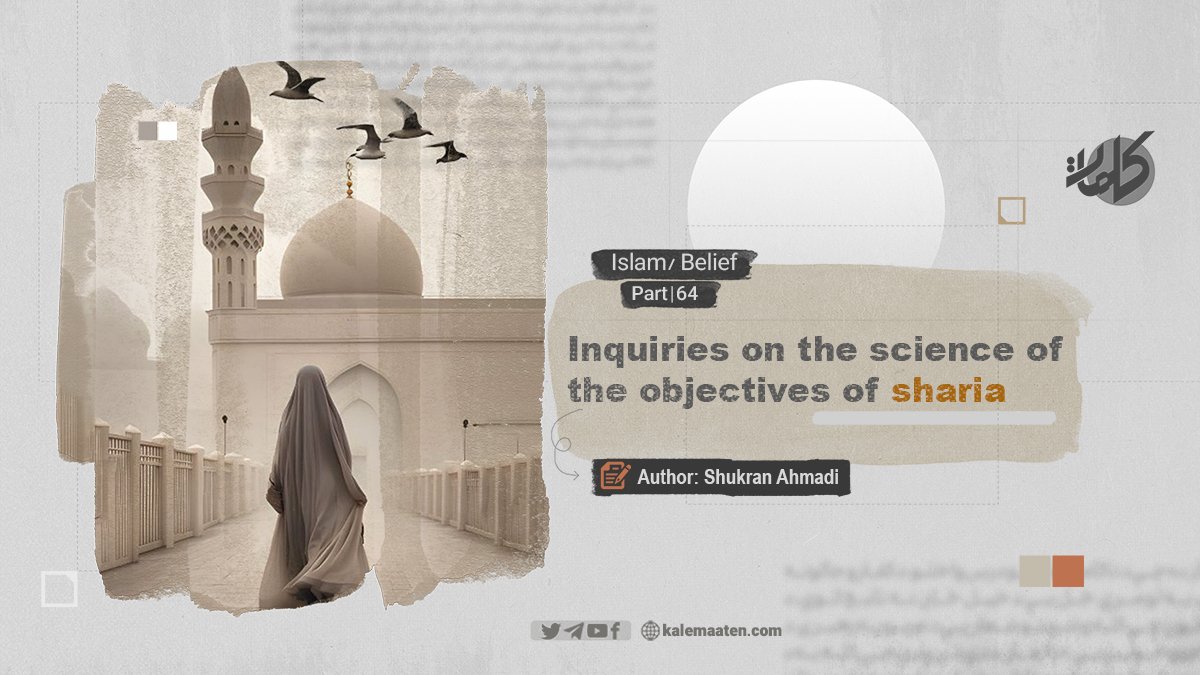Author: Shukran Ahmadi
Inquiries on the Science of the Objectives of Sharia (Part 64)
Topic Two: The Rules of the Objectives of Islamic Sharia
The rules of the Objectives of Sharia are divided into two categories: one, general rules and the other, specific rules, each of which we will explain below:
1. General rules
The general rules of Islamic Sharia are rules that are applicable in every section. Some of these rules are as follows:
1. Divine legislation has been revealed to realize the interests of the servants; therefore, commands, prohibitions, and permissions realize the interests of the obligated persons.
2. Sharia has been established in order to secure the interests of the people.
3. Sharia duties have been determined to protect the Objectives of the people, and these objectives are divided into three categories: necessities, needs, and praises.
4. Islamic Sharia includes the specific interests in each issue and the general interests in total.
5. The principles or general interests on which the Sharia revolves are five things: preserving religion, preserving the soul, preserving intellect, preserving wealth, and preserving lineage (ancestry).
6. These general principles and interests also include specific interests, because there are no interests greater than these.
7. Preserving necessities is an episodic matter in all nations; but the methods of preserving them are different in each religion.
8. The methods of preserving necessities and needs are different in each case, and by considering the specific characteristics and other essential matters, its method is also determined.
9. Whenever the pursuit of interests is accompanied by corruption, corruption should be avoided as much as possible.
10. In the event of violating the five necessities, retaliation should be made as much as possible so that the corruption is eliminated.
11. General principles cannot be abrogated, but abrogation is possible in specific principles.
12. The opposition of specific matters to a general principle does not remove it from the scope of being general.
13. Preserving necessary purposes is possible from two areas: positive and negative.
14. Intellect is not able to understand all general and specific objectives; because the Sharia includes specific Objectives that the intellect has not understood.
15. Acting on objectives is based on Sharia criteria.
16. Those objectives that contradict the Sharia text are considered invalid. [1]
2. Specific rules
Specific rules are the same group of rules that belong to a part of the Sharia objectives. We will mention some of these rules:
A: Rules related to recognizing objectives
1. The Objectives of the Sharia are known by the Book, the Sunnah, and consensus.
2. Whatever causes the preservation of the five principles is considered beneficial and its opposite is considered corrupt. [2]
3. If an objective does not have a Sharia principle, it is considered invalid. [3]
4. the greater corruption is repelled by the minor corruption in the event of conflict between corruptions. [4]
5. A hardship or corruption is not desirable in itself. [5]
6. Haraj (hardship) is permissible, and any means that lead to the creation of a hardship; according to the rule of «للوسائل حكم المقاصد»Translation: “The means have the same ruling as the ends.” is also permissible. [6]
7. Any principle that does not have an explicit text in Sharia but agrees with the general rules of Sharia is considered a Sharia principle. [7]
B: Rules related to means of objectives
1. Means have the rule of objectives. Just like the rule: «ما لايتم الواجب إلا به فهو واجب.»Translation: You cannot complete the obligatory except by means, so it is obligatory.” [8]
2. If a forbidden means achieves a more desirable interest, that means is permissible. Such as paying money to the enemy in exchange for the release of Muslim prisoners, although paying money strengthens the infidels; But the freedom of the Muslim is more important. [9]
3. The failure of the objective causes the failure of the means, unless this means is also used for another matter. Such as purity, which does not invalidate wudu if one does not pray; because it is useful for reciting, remembering, touching the Quran, etc. [10]
4. Any action that leads to corruption or that repels the benefit is not correct. [11]
5. Whenever an objective is achieved by several means, the strongest of them is valid and if the means are equal, the obligated person has the choice in choosing it. [12]
6. Tolerance is made in the means, not in the Objectives. For example, the time limit in a guarantee is not correct at all, but in a guardianship, it is a matter of dispute. [13]
Continues…
Previous Part/ Next Part
[1]. As cited in Al-Muwafaqat by Imam Shatibi, 449-453.
[2]. Ghazali, Al-Mustasfa: 179.
[3]. Al-Yubi, Maqasid al-Sharia al-Islamiyya wa Alaquatuha bil-Adilla: 454.
[4]. Ghazali, Al-Mustasfa: 178.
[5]. Al-Shatibi, Al-Muwafaqat, vol. 1, 237.
[6]. Al-Yubi, Maqasid al-Sharia al-Islamiyya wa Alaquatuha bil-Adilla: 454.
[7]. Al-Shatibi, Al-Muwafaqat (1/32).
[8]. Qarafi, Al-Furuq (3/3).
[9]. Ibn Hazm, Qawa’id al-Ahkam fi Masalih al-Anam (1/87).
[10]. Qarafi, (2/44).
[11]. Ibn Hazm, Qawa’id al-Ahkam fi Masalih al-Anam (2/89).
[12]. Al-Yubi, Maqasid al-Sharia al-Islamiyya li Ibn Ashur (2/151).
[13]. Abd al-Rahman ibn Abi Bakr Jalal al-Din al-Suyuti (1990), Al-Ashbah wa al-Naza’ir, Beirut, Dar al-Kutub al-Ilmiyya: 158.



